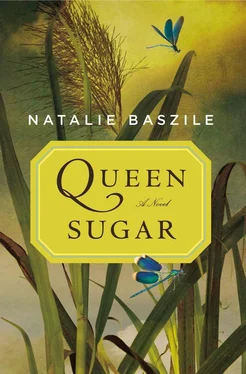“I’m fresh out of promises.”
“Promise that when it gets to be too much for you, you’ll come to us first. Mr. Landry was right about one thing, Miss Bordelon, you’ve got a fine spread. But it’s like anything else. One can only exploit an opportunity with the right resources.
“What could you possibly know about my resources? My resources are fabulous.”
Baron shrugged. “If your resources were so fabulous, you wouldn’t be looking to buy one of these rusted heaps.” He smiled with front teeth square as Mahjong tiles. “Come to think of it, I’ll sweeten the deal. On behalf of Saint Mary’s Sugar Co-op, we’ll be glad to take that land off your hands whenever you’ve had enough. We’ll offer a fair price, of course, and I may be able to convince our board to throw in some lagniappe for your efforts.”
Charley looked at Baron. She should walk away, she knew she should. It was what Denton had been asking her to do for the last five minutes. But she couldn’t. “Save your offers. As a matter of fact, you two can go fuck yourselves. Mr. Denton and I will do fine.”
Baron looked at her without blinking. “Feisty,” he said. “I like feisty. Don’t lose that. But remember this: It’s one thing for you to make that claim when you’re working for someone else, Miss Bordelon. It’s different when the land is yours. When, pardon the expression, it’s your ass on the line.”
“We’ll see about that.”
“Yes, Miss Bordelon, we will.”
• • •
A voice over the loudspeaker announced the auction would start in ten minutes, and the noise level rose as farmers hurried to finish their appraisals. Charley waited for Denton to speak but he only cleaned his glasses on a napkin. The seconds dragged on.
“I didn’t mean to speak for you, Mr. Denton,” Charley said, unable to wait any longer. “I’m sorry — I just couldn’t—”
“What’s the best piece of equipment you reckon you saw this morning?” Denton’s voice was quiet. He pulled the catalog from his back pocket and flipped through it.
Charley pictured the rows of machinery and tried to recall whether she’d noticed men gathered around any single piece. “I guess the John Deere you were looking at.”
“Wrong.” Denton slid his catalog toward her, a tiny, almost imperceptible gesture. “That one.” He tapped a picture of an I.H. 1066. “International Harvester. That’s the machine we’re going to buy.”
Charley studied the picture. “But you spent all your time at the John Deere. How can you be sure the I.H. is better when you didn’t even—”
Denton shook his head like he wasn’t surprised she was dumb enough to overlook it. “It was right up front by the entrance. I know the farmer who owned it. His initials are on the chassis. He was a good man, a talented farmer, always took good care of his equipment. But his wife got sick, something with her heart, and he couldn’t pay her medical bills and cover farm expenses. Pretty soon he was underwater.” Denton shook his head. “It’s a shame.” He rolled the catalog into a scroll, slid it in his pocket.
• • •
Exactly on the hour, a pickup with a camper shell, a hole the size of a car window cut into the side, the auctioneer peering through it, pulled up at the far side of the yard.
“All right, boys,” the auctioneer said, through a bullhorn, “let’s get started so we can get out of here.”
When the camper swung around, Charley saw the two women from the office perched on stools just inside the camper’s back door.
At the sound of the auctioneer’s voice, the men under the trees dragged themselves out into the open, where the heat rose off the gravel in waves, and that was when the reality of why they were there hit Charley hard. She and Denton were there to benefit from others’ misfortune like everyone else, brotherhood and slapping backs be damned. And if the wind didn’t blow in her favor, Charley thought, she could easily be back here in a year, standing at the back of this very same crowd while these vultures picked the last scrap of flesh from her bones.
A rap of the auctioneer’s gavel started the bidding. “Lot ten-dash-four,” he announced as if calling a square dance. “A Taylorway twelve-inch disc. Like new. We’ll start at five hundred. Five, five, five hundred. Five hundred dollars. Come on, boys, let me see the money.”
Men signaled their interest with nods and hand gestures. Charley followed along as best she could, struggling to decipher the auctioneer’s warbling, making notes in the margins of her catalog. There was a new energy, a fresh excitement in the air. Suddenly, everything moved faster. The small stuff went first. Tools and farm implements, things, Charley imagined, that would wind up in a roadside antique mall if they weren’t put to some farm use.
An hour later, the lot was even more crowded, and the bidding was going strong. They’d moved to the large items. Charley flipped to the catalog page that showed the I.H., surprised at how anxious she felt.
Denton leaned close. “I want you to sit tight. Don’t show your hand.” He scanned the crowd, his gaze resting on one face and then another, as though he were sizing up their competition.
“Lot one twenty-four,” the auctioneer called. “We’ll start the bidding at eighty-five hundred. Eight five. Eighty-five in the back. Eight five, who’ll show me nine?”
Without looking at her, Denton tapped Charley’s leg. “Put up your card.”
“But it’s an Allis Chalmers,” Charley whispered, consulting her catalog.
“Nine. Nine. Do I hear nine five?” The auctioneer’s voice drove the crowd forward. “Nine five down in front. Who’ll give me ten? Anyone gonna elbow in?”
“I know what it is,” Denton said. “Raise your card.”
“Ten down in front. Who’ll give me ten five? How ’bout ten and a quarter?” Ten and a quarter, ten and a quarter for lot one twenty-four. Ten and a quarter in the second row. Let’s have ten five.”
Charley started to raise her card, then hesitated.
“Please, Miss Bordelon. Do like I’m telling you. Remember what you promised at the Blue Bowl?” The force of Denton’s tone stung her. Charley raised her card.
The auctioneer nodded. “Ten five in the back. Who’ll give me eleven? Eleven on the side, thank you, sir. Eleven for the Allis Chalmers. Can I get eleven five?”
“Keep going,” Denton said.
Charley raised her card again. “But we don’t want—”
“Eleven five in the back. Thank you, madam. Do I have twelve? Twelve on the side again.”
Charley saw Denton glance over at the last bidder, a man standing on the far side of the lot with his arms folded. He didn’t look in their direction, but something in his manner, the way he stared straight ahead, told Charley he was watching them.
“That’s the rainmaker,” Denton said.
“What the hell is a rainmaker?”
“Someone who bids just to drive the price up,” Denton explained, and went on to say most times, they worked for the auction house, but sometimes for the person who was selling. “I wanted to put some bait out there, see what we caught.”
“What did we catch?”
“Baron. Riding your tail. Bidding you up.” Denton ran his hand over his face. “Give me a second to think.”
The bidding was at thirteen thousand. The auctioneer scanned the crowd. “What y’all thinking, boys?”
Denton nudged Charley. “Sit tight.”
He was gone before Charley could ask where he was going, and the Allis Chalmers sold while she waited patiently. The I.H. would be up soon. Charley tried not to look at the rainmaker, but when she glanced around for Denton, their eyes met. He nodded and touched the brim of his cap, a small gesture, one that could be mistaken for a bid if a person didn’t know better, but Charley felt certain it was a signal for her — a threat, or worse, a promise — and for a moment, she couldn’t decide who was more terrifying: Baron and Landry in their corporate uniforms, wielding their power in her face, or the rainmaker, looking like a KGB agent in his dark glasses and devil’s goatee. And then Charley’s mind cleared and she was annoyed with herself for being afraid. Maybe Denton had jumped to conclusions. Maybe the man wasn’t a rainmaker. Maybe he was just being polite.
Читать дальше












